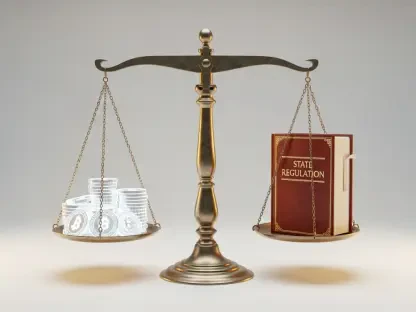In a striking display of bipartisan unity, a coalition of 50 attorneys general from across the United States has come together to confront a pressing digital threat that undermines public safety and state economies. This collective effort targets the rampant spread of illegal online gambling, a shadowy industry that operates beyond the reach of state regulations and often exploits vulnerable individuals. With the rapid growth of internet-based platforms, these illicit operations have become increasingly sophisticated, evading traditional enforcement methods and posing risks such as fraud, addiction, and significant financial loss to unsuspecting users. The urgency of this issue has prompted state leaders to call on the U.S. Department of Justice (DOJ) for stronger federal action, highlighting a critical gap in the current regulatory framework. This development signals a pivotal moment in the ongoing battle to protect consumers and preserve the integrity of legal gambling markets nationwide.
Addressing a Growing Digital Threat
The Scale of Illicit Online Operations
The proliferation of illegal online gambling platforms represents a formidable challenge to both state and federal authorities, as these entities often operate across jurisdictional boundaries and even internationally. Many of these websites lure users with promises of easy winnings, only to expose them to rigged systems and predatory practices that can lead to devastating personal consequences. Beyond individual harm, the unchecked growth of such platforms siphons substantial revenue from regulated gambling industries, which are critical sources of tax income for state budgets. This financial drain hampers funding for essential public services, from education to infrastructure. The attorneys general argue that without robust federal intervention, states alone lack the resources and reach to effectively dismantle these sprawling networks. Their unified plea to the DOJ underscores a shared recognition that the scale of this issue demands a coordinated, multi-level response to safeguard both economic stability and consumer welfare in the digital age.
Risks to Vulnerable Populations
A particularly alarming aspect of illegal online gambling is its disproportionate impact on vulnerable groups, including minors and individuals struggling with addiction. Unlike regulated platforms that enforce strict age verification and responsible gaming measures, illicit sites often have no such safeguards, making them easily accessible to those least equipped to handle the risks. This lack of oversight not only exacerbates gambling-related harm but also exposes users to additional dangers such as identity theft and financial scams. The attorneys general have emphasized that these platforms prey on desperation, often targeting communities already facing economic hardship. Their call for DOJ action highlights the need for enhanced technological tools to detect and shut down these operations before they can inflict further damage. Protecting society’s most at-risk members is a central pillar of this initiative, reflecting a broader commitment to ensuring that the digital landscape does not become a breeding ground for exploitation.
Strengthening Federal and State Collaboration
Building a Unified Enforcement Strategy
To combat the sophisticated networks behind illegal online gambling, the coalition of attorneys general has stressed the importance of a unified enforcement strategy that bridges the gap between state and federal efforts. Many of these illicit operations exploit loopholes in current laws by hosting servers in foreign jurisdictions, rendering state-level interventions insufficient. A stronger partnership with the DOJ would enable access to advanced cybercrime resources, including cutting-edge tracking technologies and international cooperation agreements. Such collaboration could disrupt the financial underpinnings of these illegal sites by targeting payment processors and other facilitators. The state leaders advocate for a comprehensive approach that not only shuts down existing platforms but also deters future violations through stricter penalties and proactive monitoring. This strategic alignment aims to create a formidable barrier against digital crime, ensuring that legal gambling markets are protected from unfair competition.
Enhancing Regulatory Frameworks for the Future
Looking ahead, the push for federal action also involves a critical examination of the existing regulatory frameworks governing online activities, with an eye toward long-term solutions. The attorneys general have pointed to the need for updated legislation that addresses the unique challenges posed by internet-based gambling, including clearer definitions of legality and jurisdiction in the digital realm. They propose the development of federal guidelines that states can adopt to ensure consistency in enforcement while allowing for localized adaptations. Additionally, investing in public awareness campaigns about the dangers of unregulated gambling sites could empower consumers to make informed choices. This forward-thinking approach seeks to balance innovation with oversight, recognizing that as technology evolves, so too must the mechanisms designed to protect the public. By advocating for these enhancements, state leaders hope to lay the groundwork for a safer online environment that prioritizes both economic integrity and individual security.
Reflecting on a Collective Stand
A Historic Bipartisan Effort
Looking back, the unified stance of 50 attorneys general marked a historic moment of bipartisan cooperation in addressing a digital crisis that transcended political divides. This rare consensus demonstrated a shared understanding that illegal online gambling was not merely a state issue but a national concern requiring collective resolve. Their formal request to the DOJ reflected a meticulously coordinated effort to highlight the urgency of the problem, drawing attention to the sophisticated tactics employed by illicit operators. By coming together, these state leaders amplified their voice, ensuring that the federal government could no longer overlook the pervasive threats posed by unregulated platforms. This coalition set a powerful precedent for how cross-jurisdictional challenges could be tackled through solidarity, emphasizing that public safety and economic fairness were paramount priorities worth uniting over in the face of complex digital threats.
Charting the Path Forward
Reflecting on this initiative, it became evident that the path forward hinged on actionable steps that could transform concern into concrete results. The call to the DOJ was just the beginning; sustained pressure was needed to ensure that federal resources were mobilized effectively to dismantle illegal gambling networks. Beyond enforcement, there was a clear imperative to explore legislative reforms that would close existing loopholes and adapt to emerging technologies. Collaboration with tech experts to develop tools for identifying and blocking illicit sites emerged as a critical next step. Additionally, fostering international partnerships to address offshore operations was seen as essential to curbing the global reach of these platforms. This multifaceted approach, sparked by the attorneys general’s urgent plea, laid out a roadmap for protecting consumers and preserving state revenues, offering hope that the digital landscape could be reshaped into a space of integrity and accountability.









